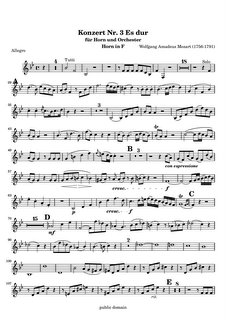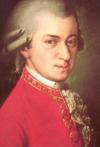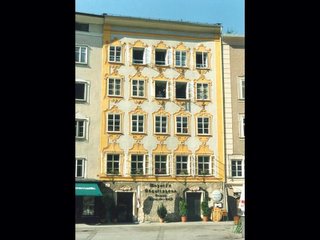WOLFGANG AMADEUS MOZART { 1/27/1756 -- 12/5/1791 }


 Mozart`s Birthplace Salzburg
Mozart`s Birthplace Salzburg
THE OPERAS
Apollo et Hyacinthus, K.38 (13.5.1767 University of Salzburg) (intermezzo)
La finta semplice, K.51 (KE 46a) (1.5.1769 Archbishop's Court, Salzburg)
Bastien und Bastienne, K.50 (K.46b) ((?) 10.1768 Dr. Mesmer's House, Vienna; 2.10.1890 (or 20.10.1890?) Architektenhaus, Berlin)
Mitridate, Rè di Ponto, K.87 (K.74a) (26.12.1770 Teatro Regio Ducal, Milan)
Ascanio in Alba, K.111 (17.10.1771 Teatro Regio Ducal, Milan)
Il sogno di Scipione, K.126 ((?) 1.5.1772 Archiepiscopal Residence, Salzburg)
Lucio Silla, K.135 (26.12.1772 Teatro Regio Ducal, Milan)
La finta giardiniera, K.196 (13.1.1775 Redoutensaal, Munich)
Il rè pastore, K.208 (23.4.1775 Archiepiscopal Residence, Salzburg)
Zaide, K.344 (K.336b) (1779; 27.1.1866, Frankfurt) (incomplete)
Idomeneo, ossia Ilia ed Idamante, K.366 (29.1.1781 Court Theatre, Munich) (Idomeneo, Rè di Creta)
Die Entführung aus dem Serail, K.384 (16.7.1782 Burgtheater, Vienna)
L'oca del Cairo, K.422 (1784; 4.1860, Frankfurt) (fragment)
Lo sposo deluso, ossia La Rivalità di tre donne per un solo amante, K.430 (K.424a) (1784) (fragment)
Der Schauspieldirektor, K.486 (7.2.1786 Schönbrunn Palace, Vienna)
Le nozze di Figaro, K.492 (1.5.1786 Burgtheater, Vienna)
Il dissoluto punito, ossia il Don Giovanni, K.527 (29.10.1787 Nationaltheater, Prague)
Così fan tutte, ossia La Scuola degli Amanti, K.588 (26.1.1790 Burgtheater, Vienna)
La Clemenza di Tito, K.621 (6.9.1791 Nationaltheater, Prague)
Die Zauberflöte, K.620 (30.9.1791 Theater auf der Wieden, Vienna)
God Bless
"Bella Vita Militar" from "Cosi Fan Tutti"
Happy 250th Birthday, Wolfie.
V
MOZART`S DEATH "VAMPIRE" Book One "ALUCARD"
In Vienna, in 1790-91, police were mystified over a series of deaths of young women who seemed to have been drained of blood, possibly by some apparatus attached to their necks. There were eight murders in 1790 of poor impoverished women, and four more in the early months of 1791.
Investigation into these deaths was cursory since the women were presumed prostitutes and there was little public outcry.
However, starting in June of that year, there were four more deaths of young women under the same peculiar circumstances. These young women were of Society, one of distant royal birth, and the police scrambled for solution, to no avail. The last of these deaths occurred in November, 1791, and suddenly Vienna was free of this evil.
Van Helsing continued; there was information in the society pages, in the same two years, of the temporary residence in Vienna of a Count Vlad Tepes from Roumania. This was the same Count Tepes, using the name Dracula, who van Helsing`s grandfather had battled 100 years later!
The newspaper clippings were almost entirely an account of Tepes` attendance at performances of symphonic music and opera, usually written by Wolfgang Mozart. In the year 1791, Mozart was in the last year of his life and was working on his massive “Requiem ", his first religious piece in eight years. He finally succumbed to what was called "feverish illness", "anemia" or "consumption".
Given the murders in Vienna, Dracula`s hate of the Catholic Church, and Mozart`s mysterious death on December 1, 1791, it was evident to the first van Helsing that the end of the murders was due to Dracula`s returning to his native land shortly after Christmas, 1791. And it was equally clear that he had accomplished his task, that of the murder of Mozart, before he could complete his liturgical masterpiece!
Van Helsing sat next to me and took my hand. "Carrie, tomorrow evening, The Opera Company of Philadelphia is producing "Die Zauberflote", "The Magic Flute", Mozart`s last great public success in Vienna, which was being performed during the time of the murders. I have no doubt that Alucard will be attending, and I have no doubt that he will approach us there. Tomorrow night, you and I will be attending the opera!"
c2005, Deabler, V.T.



